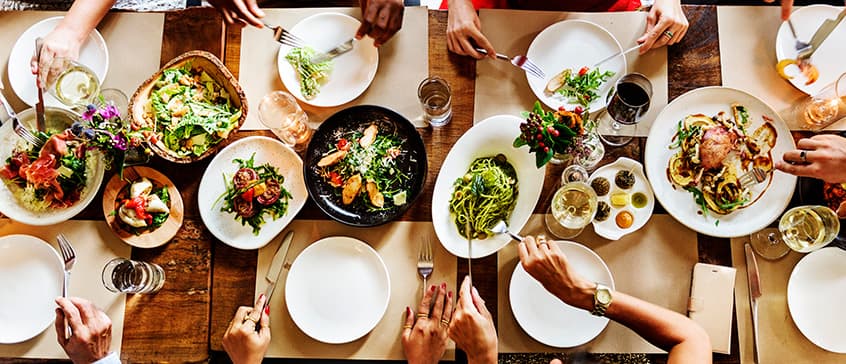Home / Humanities, Social Sciences and Law / Food for thought: how food feeds our connections
Food for thought: how food feeds our connections

by Portia Yip, Marketing Services
"Food connects us in so many infinite ways—it’s something we all need to survive, and it’s a powerful lens where we can explore identity, memory, emotion and culture,” says Dr. Ali Kenefick.
Ali’s path to becoming a food studies instructor is as diverse as the topics she explores in her classes. Beginning her academic journey at Emily Carr University, Ali studied communication design and discovered a passion for teaching while working with young children at outreach schools and summer camps.
“I love teaching, it’s my passion,” Ali shares. “I could teach almost anything and be happy about it.”
After completing her bachelor’s degree, Ali pursued a master’s in food, culture and communication in Italy. From there, she received her PhD in design sociology from Concordia University in Montreal, focusing on food systems and the complex web of consumption, production and ethics.
Now, as an instructor with Continuing Studies at UVic, Ali teaches a range of courses: Beyond the Plate: Food, Culture and Social Impact; Carnivores vs. Herbivores: Rethinking Meat and Plant-Based Diets; and Consumed: The Hidden Forces Shaping Your Food Choices. This fall, she is also teaching a new course on sacred meals in religion and rituals, and a course which looks into Ayurvedic approaches to food consumption.
Creating connections through food
Ali’s teaching philosophy is grounded in the belief that food is universal and matters to everyone. At the beginning of her courses, Ali invites learners to reflect on their personal relationships with food. “We touch on memory, history, family and culture,” she explains. “It helps students see themselves as part of a larger story and sparks connections they may not have considered.”
In her classes, Ali encourages learners to approach food studies and systems with an open mind. “Food is powerful, but it’s also deeply individual,” she notes.

We need to learn to respect different perspectives and food choices because at the end of the day, the goal is to be more accepting.”
For those who may not know as much about this field, Ali describes how food studies and systems is like the connective tissue of our world and how we can branch out and learn about how it impacts our lives. For example, food waste is a topic related to the environment and climate change.
“What makes food studies really cool is that whatever your underlying passions are, you can find a way of talking about it through food,” she shares. “Once you understand that you are a piece in a bigger system, you can start to poke at all the different doors—sociologically, politically, economically or environmentally—there are endless doors you can go through.”
Navigating complex conversations
Some topics in Ali’s courses can also be challenging, such as the ethics of meat consumption and the environmental impact of food production. But she addresses these sensitive subjects with transparency and empathy. “I’ll put up a disclaimer and let students know they can step away if a particular topic is too difficult.”
Ali aims to create an inclusive learning space where there are no wrong answers and everyone feels safe to explore their ideas. There are even times when she plays with boundaries to make people think deeper, but she’s clear about the intent. “I inform them first by saying, ‘I know this looks really biased, or politically incorrect,’ but that's the point.”
Building resilient food futures
Outside of the classroom, Ali has been collaborating on a project with Kwantlen Polytechnic University to develop bioregional food systems on Vancouver Island. This initiative is part of a broader conversation around food sovereignty—a topic Ali is particularly excited about.
“We’re looking at ways to make food systems more resilient,” she says. “The idea is to host creative workshops where producers and consumers can discuss gaps in the system and explore ways to localize food production.”
For Ali, teaching is more than a job—it’s a way to bring important conversations forward, and to invite others to think critically about the food they eat and the systems that produce it.
“Food is supposed to be enjoyed,” she describes. “And it can be a way to heal and find yourself, your family, and your place in this big, weird world.”
About the instructor
 With a doctorate in design sociology focusing on the intersections of food systems and design, Ali Kenefick is an experienced educator and interdisciplinary food studies expert. With a passion for exploring the intersection of food, culture and society, and with over two decades of experience as a designer and educator, Ali brings a vibrant, creative and unique perspective that combines theory and practice, making complex topics accessible and engaging. She is dedicated to fostering thought-provoking discussions that encourage learners to view food through new, critical lenses.
With a doctorate in design sociology focusing on the intersections of food systems and design, Ali Kenefick is an experienced educator and interdisciplinary food studies expert. With a passion for exploring the intersection of food, culture and society, and with over two decades of experience as a designer and educator, Ali brings a vibrant, creative and unique perspective that combines theory and practice, making complex topics accessible and engaging. She is dedicated to fostering thought-provoking discussions that encourage learners to view food through new, critical lenses.
- Posted July 23, 2025
Visit Registration
2nd Floor | Continuing Studies Building University of Victoria Campus 3800 Finnerty Road | Victoria BC | CanadaTel 250-472-4747 | Email uvcsreg@uvic.ca
2025 © Continuing Studies at UVic
Legal Notices |
Sitemap

